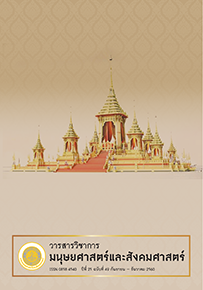บทบาทของผู้สูงอายุไทยต่อการมีส่วนร่วมพัฒนาท้องถิ่น The Role of Thai Senior Citizens on Local Development Participation
Main Article Content
Abstract
การวิจัยเรื่องนี้มีวัตถุประสงค์เพื่อศึกษา 1) บทบาทของผู้สูงอายุไทยต่อการมีส่วนร่วมพัฒนาท้องถิ่น 2) ศึกษาปัจจัยที่ส่งผลต่อบทบาทของผู้สูงอายุไทยในการมีส่วนร่วมพัฒนาท้องถิ่น และ 3) ศึกษาปัญหาและอุปสรรคของผู้สูงอายุไทยต่อการมีส่วนร่วมพัฒนาท้องถิ่น เป็นการวิจัยเชิงคุณภาพ ผู้ให้ข้อมูลหลัก จำนวน 64 คน ประกอบด้วย ผู้สูงอายุ 60 ปีขึ้นไป ทั้งชายและหญิง บุคคลในครอบครัว ที่ผู้สูงอายุอาศัยอยู่ร่วมด้วย เพื่อนบ้านหรือสมาชิกในชุมชน ปราชญ์ชุมชน และผู้นำชุมชนในภาคตะวันออกเฉียงเหนือ ภาคกลาง ภาคเหนือ และภาคใต้ เครื่องมือที่ใช้ในการรวบรวมข้อมูล คือ แบบสัมภาษณ์เจาะลึก และการประชุมสนทนากลุ่ม ผลการวิจัยพบว่า บทบาทของผู้สูงอายุในมิติด้านครอบครัว มิติด้านการศึกษา มิติด้านการพัฒนาชุมชน และมิติด้านศาสนาและวัฒนธรรม ผู้สูงอายุมีส่วนร่วมและให้ความสนใจอย่างต่อเนื่อง รวมถึงมีส่วนผลักดันให้สมาชิกในครอบครัว และคนในชุมชนเกิดความผูกพันและมีความสามัคคีร่วมกัน ส่วนปัจจัยที่ส่งผลต่อบทบาทของผู้สูงอายุไทยในการมีส่วนร่วมพัฒนาท้องถิ่น พบว่า ต้องสร้างความตระหนักในคุณค่าของผู้สูงอายุ และสนับสนุนกิจกรรมหรือโครงการพัฒนาศักยภาพความรู้ และความเชี่ยวชาญของผู้สูงอายุอย่างต่อเนื่อง สำหรับปัญหาและอุปสรรคของผู้สูงอายุไทยต่อการมีส่วนร่วมพัฒนาท้องถิ่น พบว่า ผู้สูงอายุไม่ได้มีการตั้งเป้าหมายไว้รองรับว่าตนเองจะต้องปรับตัวอยู่ในชุมชนอย่างไร รวมถึงให้ความสำคัญต่อการตระหนักในคุณค่าของตนเองน้อย
The objectives of this research were to 1) examine the roles of Thai senior citizens in local development participation 2) study the factor saffecting the roles of Thai senior citizens in local development participation ,and 3) explore the problems and obstacles of Thai senior citizens on local development participation. This study is a qualitative research with 64 key informants, including male and female senior citizens aged 60 years old or over, senior citizens’ family members, neighbors or community members, community philosophers, and community leaders in the northeastern, central, northern and southern regions. The tools used for data collection were in-depth interviews and focus group discussions. The data were analyzed using content analysis. Regarding the senior citizens’ roles in the aspects of family, education, community development, and religion and culture, it was found that they continuously participated and showed their interest in activities, as well as encouraged members of their families and communities to have unity. With regard to the factors affecting the roles of Thai senior citizens in local development participation, it was found that the senior citizens’ self-esteem should consistently be promoted, as well as the activities or projects to develop the senior citizens’ knowledge and expertise. Meanwhile, for the problems and obstacles of Thai senior citizens on local development participation, it was found that the senior citizens didn’t plan how they would adjust themselves to their communities, and they gave little importance to self-esteem.
Downloads
Article Details
บทความทุกบทความเป็นลิขสิทธิ์ของวารสารวิชาการมนุษยศาสตร์และสังคมศาสตร์ มหาวิทยาลัยบูรพาเท่านั้น


